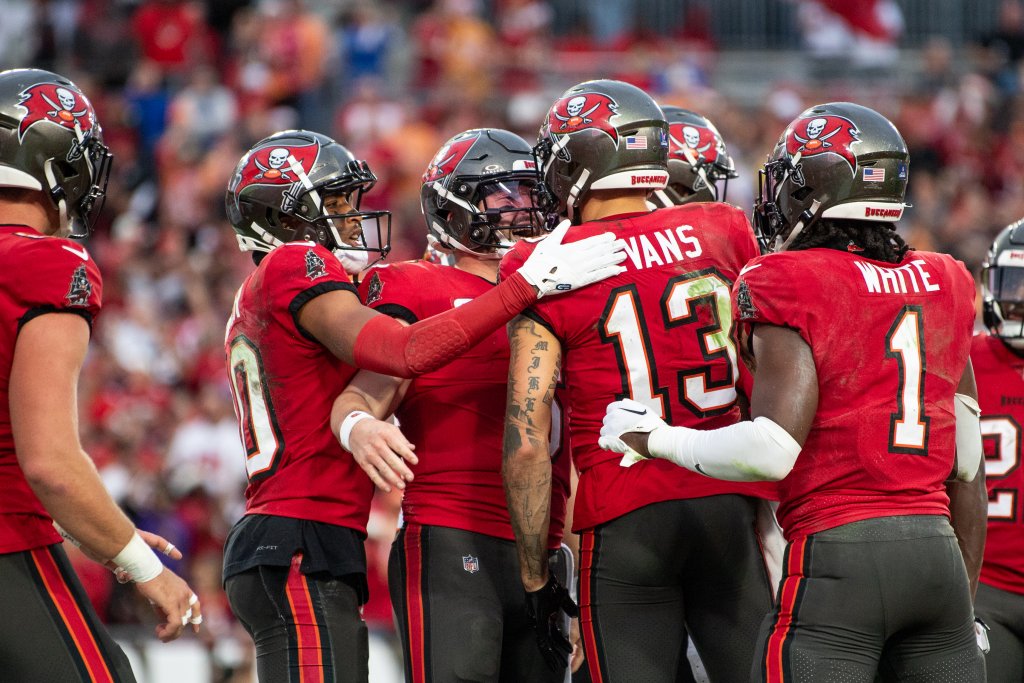West Flagler Receives Support in Florida Sports Betting SCOTUS Case
by Robert Linnehan in Sports Betting News
Updated Feb 20, 2024 · 7:28 AM PST
Dec 24, 2023; Tampa, Florida, USA; Tampa Bay Buccaneers quarterback Baker Mayfield (6) and wide receiver Mike Evans (13) celebrate a touchdown against the Jacksonville Jaguars in the second quarter at Raymond James Stadium. Mandatory Credit: Jeremy Reper-USA TODAY SportsAn amicus curiae brief was filed in support of West Flagler’s writ of certiorari to the Supreme Court of the United StatesDaniel Wallach, a gaming law attorney, filed the brief urging the court to take up the caseWallach believes the Florida gaming compact authorizes online sports betting off tribal land, which is a violation of the Indian Gaming Regulatory Act
Does the Florida gaming compact authorize online sports betting off-tribal land, which would be in clear violation of the Indian Gaming Regulatory Act?
One gaming attorney certainly believes so.
Daniel Wallach, a gaming law attorney, Founder of Wallach Legal and UNHLaw Sports Wagering, submitted an amicus curiae brief to the Supreme Court of the United States (SCOTUS) urging the court to accept West Flagler’s writ of certiorari to examine Florida’s gaming compact with the Seminole Tribe that legalizes online sports betting in the state.
Does Compact Authorize Off-Reservation Gaming?
West Flagler submitted its writ earlier this month, which claims the gaming compact between Florida and the Seminole Tribe authorizes an online sports betting monopoly that is in violation of the Florida constitution and the Indian Gaming Regulatory Act (IGRA). Florida and the Seminole Tribe approved the 30-year gaming compact in 2021, granting the tribe exclusive retail and online sports betting rights in the state.
The gaming compact granted the Seminole Tribe exclusive rights to online sports betting through a “hub-and-spoke” system, as well as expanded gaming rights, in exchange for at least $2.5 billion over the first five years. The “hub and spoke” system allowed sports bets to be placed anywhere in the state as long as they were processed by computer servers located on tribal land.
The Secretary of the Interior allowed the compact to be approved under IGRA and the D.C. Circuit upheld the approval in 2023.
The Florida gaming compact clearly authorizes gaming off tribal lands, Wallach wrote in his brief, and therefore violates IGRA. He highlighted the fact that the D.C. Circuit Court’s conclusion is a puzzling one, as it specifically notes the compact does not “authorize” the tribe’s ability to provide online sports betting off tribal lands in the state, but only “discusses” it.
It’s clear, he wrote in his brief, that the compact grants the tribe power to operate such gaming in the state.
This conclusion runs afoul of the SCOTUS decision in Murphy vs. NCAA, as the court ruled that New Jersey’s repeal of a state law banning sports gambling “had the effect of authorizing that activity.”
“The Court’s reasoning in Murphy applies with even greater force here since the compact affirmatively approves off-reservation sports gambling operations – which were not permitted under any prior compacts – and also gives the Tribe the ‘right or authority to act’ by granting it the exclusive right to operate such gaming. That is the essence of an ‘authorization’,” he wrote.
Additionally, Wallach noted that the Seminole Tribe, Gov. Ron DeSantis (R), the U.S. Department of the Interior, and Florida legislature all previously acknowledged in various public documents and press releases that the gaming compact “authorized” online sports betting in the state.
When the compact was signed in 2021, Wallach said the Seminole Tribe issued a press release proclaiming that “the 2021 Compact authorizes the Tribe to accept sports wagers in person and from patrons physically located in the state via mobile devices.”
“On that same day, Governor DeSantis – who signed the compact on behalf of Florida – issued his own press release declaring that the 2021 compact is “[l]arger and more expansive than any other gaming compact in U.S. history,” and “[m]ost notably, . . . modernizes the gaming industry through the authorization of sports betting in Florida through the Tribe.’” Wallach wrote.
Wallach also described the D.C. Circuit’s interpretation of IGRA to be “strained,” and its allowance of tribal gaming off Indian land is “fundamentally at odds with IGRA’s plain language.” The compact, he writes, clearly contradicts with the SCOTUS decision in Michigan v. Bay Mills, which declared that IGRA affords tools to regulate gaming on “Indian lands, and nowhere else.”
“The D.C. Circuit’s strained interpretation of IGRA as allowing for compacted tribal gaming activities outside of Indian lands is fundamentally at odds with IGRA’s plain language, the compact’s clear terms, and the Bay Mills decision. As such, the appropriate remedy would be for this Court to enter a summary disposition on the merits reversing the decision of the D.C. Circuit,” Wallach wrote.
What’s Next for Florida?
The U.S. Supreme Court will now determine if the writ of certiorari will be accepted and the court will hear the case. Parties involved will have the opportunity to submit their own response and additional amicus curiae briefs could also be field.
If SCOTUS denies the petition, that would be the end of the road for West Flagler with the court. However, if it decides to accept the petition, a final ruling on Florida online sports betting would likely not come until sometime in late 2025.
West Flagler Associates also has a pending lawsuit against the online sports betting provision in the gaming compact with the Florida Supreme Court.


